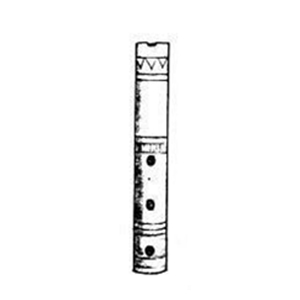Dixiuli overview

Dixiujie (Pinyin: dí xiǔ lì), also known as Jueji, Dijitu, Diohma, Olioma, Datitulai, is a side edge air-sounding instrument of the Lisu ethnic group, and it is the Lahu ethnicity's air-sounding instrument. The general term for it is popular in Nujiang Lisu Autonomous Prefecture in Yunnan Province.
The body of the flute is made of bamboo, which is similar to the columns of the Lahu people. It is often made of multi-segmented golden bamboo tubes, thick at the top and thin at the bottom, leaving a knot at the end, and the rest of the bamboo knots are transparent. The length of the tube is 13 cm, the outer diameter of the upper nozzle is 1.5 cm, and the inner diameter is 0.9 cm. A "U"-shaped mouthpiece is opened on the front edge of the tube head, with a mouth width of 0.5 cm and a mouth depth of 0.4 cm. The lower edge of the mouthpiece is very thin to make the pronunciation sensitive. There are three circular sound-pressing holes on the front of the pipe body, the first hole is opened near the end of the pipe, the third hole is opened at 1/2 of the length of the pipe, and the second hole is opened between the first and third holes. There is also a four-hole flute rotten, and a back hole is usually opened on the back of the third hole. There are also made using slender bamboo tubes.
The flute has a bright and high-pitched pronunciation, and is often used for solo entertainment or singing and dancing accompaniment. It is a popular folk instrument for Lisu children and unmarried girls.
- type:edge air musical instrument
- nickname:Jue Ji, Di Ji Tu, Di O Ma, O Li O Ma, Dati Tu Lai
- Pinyin:dí xiǔ lì
- popular area:Nujiang Lisu Autonomous Prefecture, Yunnan Province
- nationality:Lisu people
overview of other similar instruments
- sanyanxiao overview
- Daguangxian overview
- Leiqin overview
- hahao overview
- yandundagu overview
- Han Xiaozheng overview
- Fang Xiang overview
- guanzi overview
- zhuqin (Dao Qin) overview
- zhuiqin overview
- bangzi overview
- three-stringed piano overview
- Gehu overview
- xiao overview
- xiaokonghou overview
- Konghou overview
- Sheng overview
- suona overview
- hulusi overview
- gushao overview
 渝公网安备 50010702504639号
渝公网安备 50010702504639号